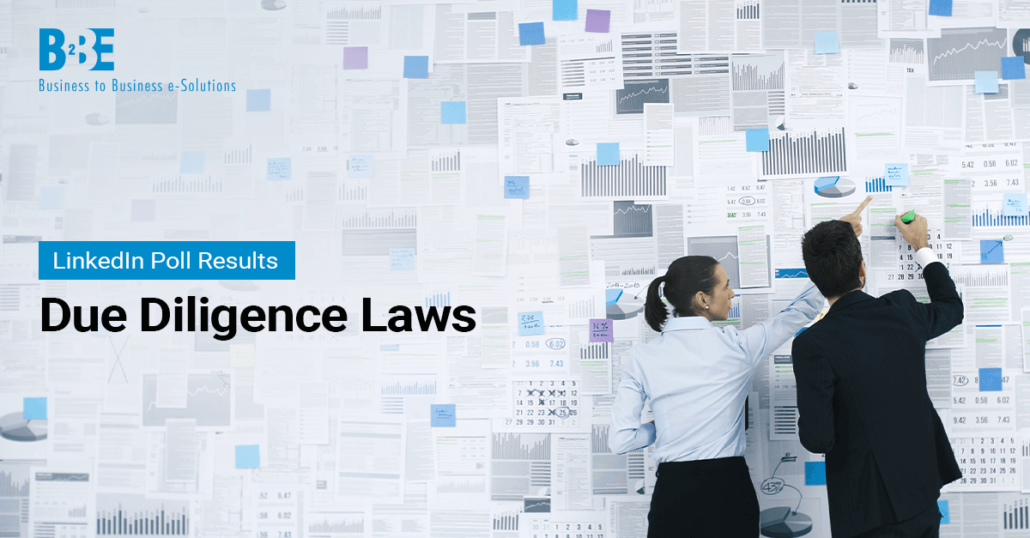As globalisation continues to shape the modern economy, supply chains have become increasingly complex and interconnected. This has brought many benefits to businesses and consumers alike. However, it has also exposed a range of social and environmental issues associated with the sourcing and production of goods. In response to these challenges, governments around the world have been exploring ways to hold companies accountable for the impacts of their supply chains. One of the latest measures being considered is a supply chain due diligence law. This would require companies to assess and address human rights and environmental risks throughout their supply chains.
Poll results
In our most recent LinkedIn poll, we asked our social media followers if their business will be impacted by a supply chain due diligence law in the next 12 months, and if they are ready.
Supply chain due diligence law: what we found
Yes, and we’re ready – 71%
71% answered ‘Yes, and we’re ready’ to whether their business will be impacted by a due diligence law in the next year. This is good news for a number of reasons. Firstly, it suggests that these businesses have already taken steps to address the risks associated with their supply chains. These businesses are therefore in a better position to comply with any future legal requirements. This proactive approach not only reduces the risk of legal or reputational damage, but can also lead to improved business performance and resilience long term.
Secondly, it shows that businesses are increasingly aware of the importance of responsible and sustainable supply chain management. It illustrates they are willing to invest time and resources in this area. This trend is not only positive for individual companies, but also for wider society and the environment. Particuarly as it helps to promote ethical and sustainable business practices across industries.
Yes, we’ll revise policies – 14%
De 14% of respondents who answered ‘Yes, we’ll revise policies’ may have several reasons for doing so. They may have identified gaps or weaknesses in their existing policies and procedures for managing supply chain risks. As a result, they may recognise the need to strengthen these to comply with any new due diligence law. This could involve reviewing and updating their due diligence processes or improving transparency and accountability in their supply chains. As well as developing new policies around issues such as human rights or environmental sustainability.
These businesses may recognise the potential benefits of taking a more proactive approach to supply chain management. For example, improved risk management, enhanced reputation and brand value, and better stakeholder engagement. By revising their policies and procedures now, they may be able to position themselves as leaders in responsible and sustainable business practices. This can allow businesses to gain a competitive advantage in the market.
No, but we’re ready – 14%
14% answered no, but we’re ready. These businesses may already have robust due diligence procedures in place, which enable them to identify and mitigate supply chain risks effectively. In this case, they may not anticipate any significant impact from a new due diligence law, as they are already complying with best practices. These businesses may have already taken steps to future-proof their supply chain operations, by anticipating and adapting to changes in the legal or regulatory landscape. This may involve investing in new technologies or tools to track and monitor supply chain risks. Or developing partnerships with suppliers and other stakeholders. Businesses can also participate in industry-wide initiatives to promote responsible business practices. By being proactive and forward-thinking, these businesses are better positioned to weather challenges that may arise from a due diligence law.
No, and we’re not ready – 0%
The fact that 0% of respondents answered ‘No, and we’re not ready’ is good news for several reasons. Firstly, it suggests that all businesses who participated in the poll recognise the potential impact of a new legal requirement on their supply chain operations. They may already be taking steps to prepare for this eventuality. This proactive approach can help to reduce the risk of legal or reputational damage. As well as ensuring that businesses are well-positioned to comply with any new due diligence law when it come into effect.
Secondly, it indicates that there is a growing awareness of the importance of responsible and sustainable supply chain management among businesses of all sizes and industries. This trend is positive for wider society and the environment. It helps to promote ethical and sustainable business practices. As well as driving progress towards a more equitable and sustainable global economy.
Meer informatie
B2BE's ervaring in de toeleveringsketensector stelt onze klanten in staat met succes te bouwen, uit te breiden en zich aan te passen, waardoor een grotere effectiviteit mogelijk is. Om in contact te komen met B2BE en feedback te geven over wat voor u en uw bedrijf het belangrijkst is, kunt u het volgende doen volg ons op LinkedIn en via sociale media. U kunt ook Stem in onze laatste LinkedIn poll. Als u uw supply chain-strategie wilt bespreken, contact opnemen met ons.
